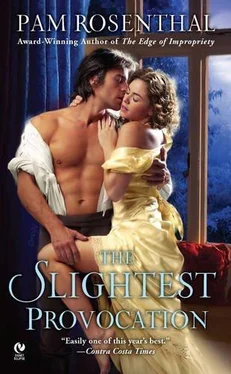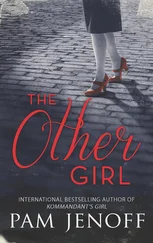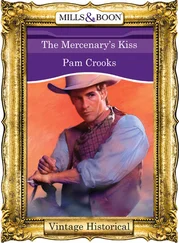As you like, madam, he’d replied. A brief pause to recover his equilibrium, and he’d launched into an elaborate disquisition on poetic spirit and inner vision-capabilities, he feared, that were rather beyond her petty limitations.
It had been a stimulating lecture, though she might have gotten equally good conversation if she’d stopped back with Miss Godwin. Still, she listened obligingly, while the wind off the lake turned chilly and the light of the poet’s intellect bade fair to burn deep into the night. He might have chosen a gentler way to frame his argument. He probably would have, if she’d been better able to hide her amusement.
Give me another decade, she thought now, and I’ll master the extra measure of control. No need to ask for the decade, of course; it would come whether she liked it or not. And by the time it did come, by the time she was forty…
But she’d just had a birthday; she was thirty- one now, and (as though to illustrate the passing of time) had recently acquired a pair of small, gold-rimmed, oval reading spectacles. There had been letters of birthday congratulation from England, and one from Matthew Bakewell in France; he was studying the wonders of Jacquard weaving in Lyon. Too delicate to ask whether she’d finally seen her estranged husband, he’d simply written how much he missed her company, was counting the days to Midsummer Eve when they’d be together, and looked forward, finally, to a resolution of their complicated situation.
After nine years of separation from Kit Stansell, she wanted some resolution as well. Something simple and settled, with a man as fine as Matthew.
Just be happy with Miss Godwin, she’d exhorted young Shelley. Leave aside the fantasies of communal love, and for God’s sake get rid of the stepsister .
Leave aside all the fantasies. And the memories as well.

A gentle snore bubbled from Peggy’s open lips. The coach swayed, righted itself on its springs, and turned onto a smaller road. The inn was close by the city gates; they couldn’t have too much farther to travel.
On the whole, Mary thought, Percy Shelley had been quite correct in his assessment of her. She loved poetry, liked poets, and was clever enough with words herself, but the poetic temperament was as little her forte as the ironic was his.
Irony, a penchant for exaggerated self-scrutiny, perhaps, and a small skill at observation-as if it would take any skill to discern what was going on between Peggy and Lady Rowen’s handsome footman, Thomas.
What had taken skill was ignoring it. Easier before today: the good weather and smooth roads had helped. The coach Lady Rowen had lent her was so well sprung and comfortable that Mary had been able to occupy herself with books or her journal, when she wasn’t staring out the window, reliving her peregrinations: Rome, Florence, Venice; Greece and Turkey; the Alps; and castles along the Rhine.
Since Waterloo, every Englishman and -woman who could afford it was touring the continent, trudging up mountainsides, gaping at monumental ruins, buying up nearly everything else, and-according to Lord Byron anyway-rendering the place utterly uninhabitable.
Mary had found it quite delightfully habitable; she’d spent a wonderfully entertaining year, moving at a brisk pace with a series of charming companions. The only annoyance was the occasional stupidity of being cut, by widgeon-brained people one could avoid in London but might unexpectedly bump up against at Ephesus or Pompeii. Small matter. Her separation from her husband was stale news; her association with the Shelley party, respectable if a bit outré; her latest less-than-respectable liaison managed discreetly and recently brought to an amicable close.
Anyone she might actually want to be acquainted with was happy to know her, for she made a charming tourist-earnest and inquisitive, amused rather than annoyed by the inevitable mishap; frightfully well-informed and endlessly appreciative of whatever there was to be seen.
Today’s plaguing mood was an aberration, no doubt brought on by all the rain. Peggy and Thomas had been most circumspect, but there could be no ignoring them with everyone so jumbled together by the weather. A formidable storm had blown in; a lesser coachman than Mr. Frayne might have refused to start out this morning.
Perhaps he’d been overzealous. A pity to work the horses so harshly. But he was proud of his skill, and (like all of the dowager marchioness’s servants) devoted to doing his best. He was also-when given the rare chance to converse with two-legged creatures-more than a little bit pompous and long-winded.
Big arms folded beneath his voluminous cape, he’d whistled through the gap in his teeth, decrying the bloody hellishness (begging the lady’s pardon, perhaps he should say the capriciousness ) of the elements. But seeing as it was such a first-rate vehicle the marchioness kept, and what with Lady Christopher wanting to get home to England as soon as possible, he thought he could see them through.
Clutching his top hat in front of him in an exaggerated show of decorum, he’d promptly ruined the effect by his insinuating pronunciation of Lady Christopher, all but winking to show that he knew a thing or two, being so long in the family’s service. Though of course he’d never breathe a word of it.
Ah, well. Better-bred people had said and done much worse. The brewer’s daughter had learned to respond affably to a title that felt (more than ever in her current circumstances) like fancy dress. The woman estranged from her husband was quite accustomed to being quizzed.
The storm, Mr. Frayne. Do go on, sir.
Well, then. He drew a breath.
The local people were of the opinion that the storm was like to pass by nightfall. Not that you could entirely trust them Frenchies and their stories. Still, it looked that way to him as well.
It’ll be a hard day for sure (he seemed to be concluding his remarks now), but if my lady and the little maid is willing to trudge through the wet an’ the muck alongside the coach when we comes to some o’ the biggest hills-well, then, ma’am, you can lay your trust on Thomas and me to do for you.
Thomas had nodded with great seriousness, and Peggy had beamed up at him proudly.
Good. Then we’re off. (Mary had begun to turn away.) Thank you, Mr. Frayne.
With lu-u-u-ck, Mr. Frayne had added (the latter syllable stretched almost to the breaking point of ponderous slowness, to signal that Mary must turn back and hear him out), you’ll be sleeping in an honest English bed tomorrow night, Lady Christopher. One more night on French soil, and by tomorrow I’ll be putting you on the Dover-Calais packet, safe and snug and more or less in one piece.
Yes. Thank you very much indeed.
In one piece. More or less. Well, with a lot more mud on her skirts and a lot less food in her stomach, since the vehicle’s jouncing and lurching had caused her to lose her luncheon several hours ago. And with bruises on her feet, from wet shoes rubbing through bunched stockings.
At least her insides had ceased their churning. She’d even felt some pleasant twinges of hunger. Tonight’s inn was reputed to have an unusually good kitchen; Lady Rowen had made particular mention of it. They should be arriving quite soon and in very reasonable time under the circumstances.
Mr. Frayne had badgered and cajoled the horses through rain and wind and muck up to their fetlocks, while Thomas handed Mary in and out of the carriage with great ceremony, holding the green umbrella over her as though she were a precious, delicate parcel, even as he sent the occasional fleeting smile back over his shoulder at Peggy splashing along behind.
Читать дальше













